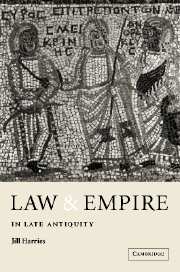Book contents
- Frontmatter
- Contents
- Preface
- Introduction
- 1 The law of Late Antiquity
- 2 Making the law
- 3 The construction of authority
- 4 The efficacy of law
- 5 In court
- 6 Crime and the problem of pain
- 7 Punishment
- 8 The corrupt judge
- 9 Dispute settlement I: out of court
- 10 Dispute settlement II: episcopalis audientia
- Conclusion
- Bibliography
- Index
- Frontmatter
- Contents
- Preface
- Introduction
- 1 The law of Late Antiquity
- 2 Making the law
- 3 The construction of authority
- 4 The efficacy of law
- 5 In court
- 6 Crime and the problem of pain
- 7 Punishment
- 8 The corrupt judge
- 9 Dispute settlement I: out of court
- 10 Dispute settlement II: episcopalis audientia
- Conclusion
- Bibliography
- Index
Summary
Interpreting the history of Late Antiquity from its laws is an enterprise fraught with risk. The legal texts which survived through the imperial codes are extracts, largely divorced from the context in which they were created and the rhetoric by which they were justified. Each ‘general law’, despite the generality of its application, may originally have been evoked by a single incident; they are, therefore, for the historian, no more than a form of anecdotal evidence, and are no guide to the extent or severity of the problem addressed. Even repeated laws do not demonstrate that a difficulty was serious, still less that previous legislation was ineffective; frequency of evocation establishes that citizens were interested in knowing about and, probably, enforcing legislation on that matter. Repeated laws were laws that worked.
Legal texts are multi-layered and contain within them some cultural tension. All imperial laws, whether complete or, as is the case with most, excerpted are an uneasy merger of statute with imperial political broadcast. They are the expression of two cultures, the legal and the imperial. The rhetoric of the laws may distract from, but seldom entirely submerges, a long legal tradition, which shaped the distinctive intellectual discipline, of which the great Severan jurists were the most eminent exponents. The priorities of emperors and lawyers were not the same. The latter sought (ideally) to expound, discuss, educate; it was not, usually, their job to tell people what to do.
- Type
- Chapter
- Information
- Law and Empire in Late Antiquity , pp. 212 - 216Publisher: Cambridge University PressPrint publication year: 1999

